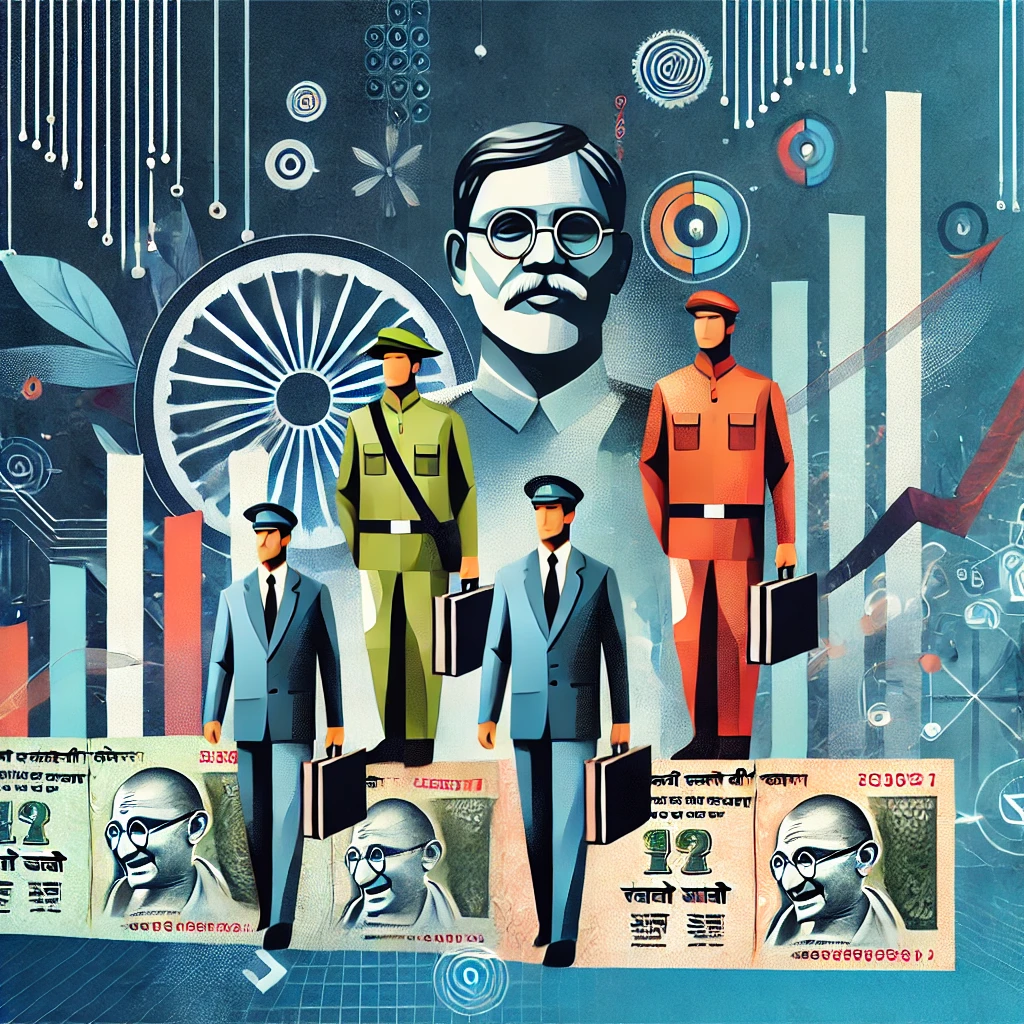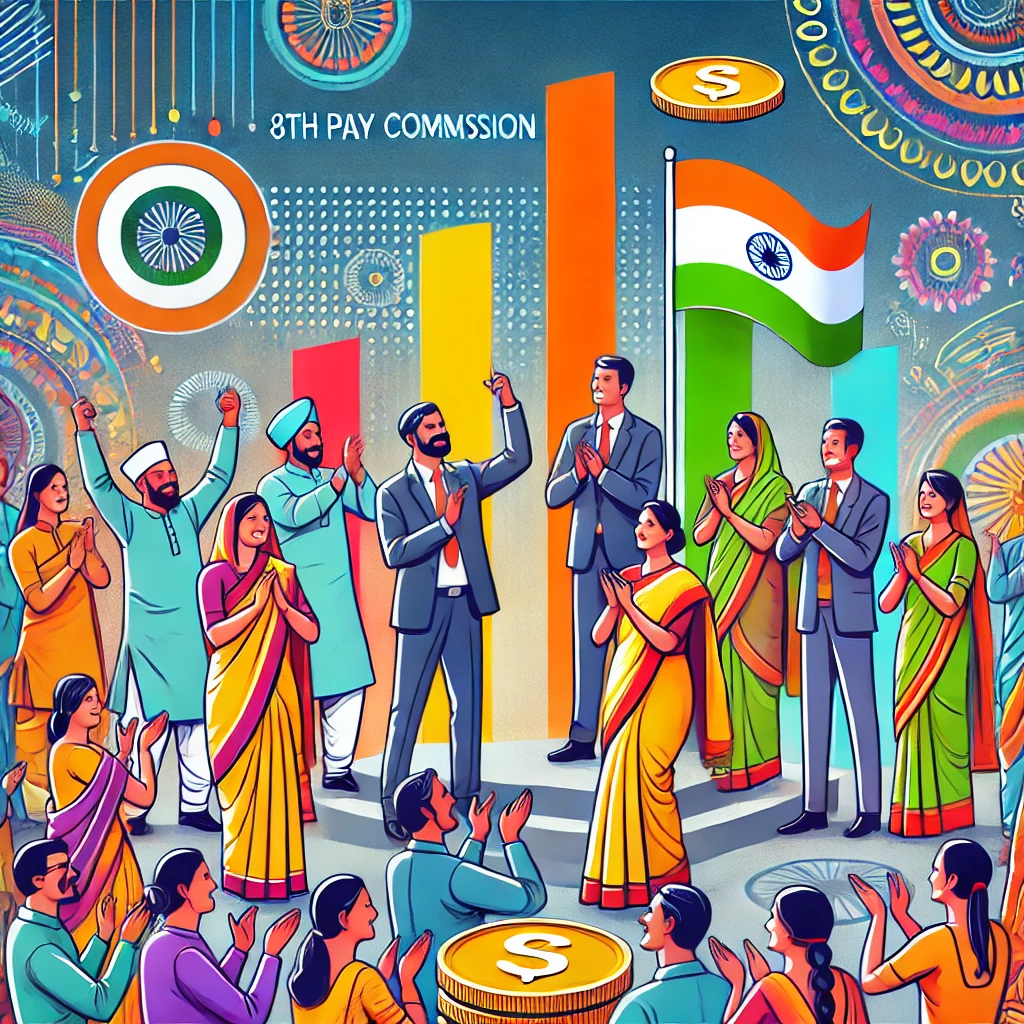The 8th Pay Commission—A New Dawn for Central Government Employees
On January 16, 2025, the Cabinet approved the 8th Pay Commission, an eagerly awaited change that will impact millions of central government employees across ministries such as railways, defense, and healthcare. This commission, set to redefine pay structures, promises not only to bring financial security to employees but also to fuel economic growth at a national level.
“The 8th Pay Commission isn’t just a policy change—it’s a financial upliftment that empowers millions and strengthens the economy.”
The 8th Pay Commission brings to the forefront the importance of timely financial reforms and is poised to have significant ripple effects in sectors like consumer retail, stock markets, and real estate. More importantly, it highlights the government’s recognition of the value that these employees bring to India’s infrastructure, security, and healthcare systems.
In this post, we will walk through the key benefits, procedures, and impacts of the 8th Pay Commission, helping you understand how this monumental step will shape India’s future.
8th Pay Commission Video
Key Takeaways
- The 8th Pay Commission offers a significant pay hike for railway employees, defense personnel, and others.
- NFIR’s role was crucial in advocating for more balanced pay scales and improved allowances.
- Increased salaries will likely stimulate growth in consumer markets, stock markets, and real estate.
- The step-by-step process behind the formation of the commission shows transparency and detailed planning.
- The 8th Pay Commission brings more than just a salary revision—it is a step toward a stronger, more prosperous India.
What is the 8th Pay Commission and Why Does It Matter?
The 8th Pay Commission is designed to overhaul the pay structure for central government employees. This major revision is long awaited, as it addresses the economic pressures faced by employees and aligns salaries with inflation and market standards. But it’s not just about raising salaries—it’s about crafting a more sustainable and fair compensation system for those who serve the nation in diverse sectors.
How is the 8th Pay Commission different?
Unlike previous revisions, the 8th Pay Commission takes a more holistic approach. Not only does it revise basic pay, but it also brings substantial changes to allowances, pensions, and healthcare benefits. This all-encompassing reform addresses the evolving needs of government employees, ensuring their financial stability and better quality of life.
Additionally, the NFIR (National Federation of Indian Railwaymen), a powerful body representing railway workers, played a pivotal role in lobbying for higher pay and better benefits for railway employees. This inclusion ensures that the commission is tailored to meet the needs of those working in essential services.
PM Approves 8th Central Pay Commission for Govt Employees | Ashwini Vaishnaw Announcement
Union Minister Ashwini Vaishnaw announced that Prime Minister Narendra Modi has approved the 8th Central Pay Commission for all Central Government employees. This landmark decision is poised to introduce significant changes to the pay structure, benefiting a vast segment of the nation’s workforce. The move is anticipated to enhance the financial well-being of central government employees across India.
How the 8th Pay Commission Benefits Central Government Employees
1. Salary Revisions: A Boost to Pay Scales
The 8th Pay Commission promises a substantial pay increase—a direct response to inflationary pressures and a rapidly changing economic landscape. Government employees can expect a 20-30% increase in their base pay, with additional perks such as revised house rent allowances, medical allowances, and travel reimbursements.
2. Pension Upgrades: Secure Future for Retirees
For retirees, the commission brings more lucrative pension plans. By improving post-retirement benefits, the 8th Pay Commission guarantees that government employees have a secure and comfortable future once they retire from service.
3. Allowances and Benefits: A Holistic Approach to Welfare
In addition to salary increments, the 8th Pay Commission increases allowances related to housing, travel, and medical expenses. This adjustment ensures that employees are better equipped to handle everyday expenses, providing them with more disposable income and peace of mind.

The Economic Impact of the 8th Pay Commission
While the 8th Pay Commission brings direct benefits to government employees, its influence extends to the broader economy, too. Let’s dive into how this pay revision could reshape India’s economic landscape.
Impact on Stock Markets
An immediate impact of the 8th Pay Commission is expected in stock markets. With the increase in disposable income, government employees will likely boost consumption. This uptick in demand could lead to higher profits for companies in sectors like consumer goods, real estate, and automobiles. Investors should watch for a surge in stocks related to these industries.
Moreover, the added financial security of employees might encourage more investments in stocks, especially in blue-chip companies that are well-positioned to benefit from the growing consumer demand.
Retail Sector Growth: A Consumer Boom
As government employees see their salaries rise, the retail market will witness a surge in consumer spending. Items such as electronics, home goods, and luxury products are likely to see an increase in demand, benefiting retailers and manufacturers alike. The 8th Pay Commission thus has a direct positive impact on India’s retail sector, making it a key player in the country’s economic recovery.
Real Estate and Housing Demand
With improved salaries and allowances, demand for housing is likely to rise. Government employees will find it easier to invest in homes, whether through home loans or purchasing property outright. This increased demand will likely boost real estate sales, positively impacting the construction industry and related sectors like interior design, appliances, and furniture.
Step-by-Step Process: How the 8th Pay Commission Was Formulated
Step 1: Formation of the Commission
The 8th Pay Commission was created with the goal of revising the salary structures to ensure that central government employees are adequately compensated. The Commission’s members collected data from various ministries and expert bodies to understand the financial and economic landscape.
Step 2: Employee Representation
Representatives from key employee unions, including NFIR, provided crucial input during this process. They raised concerns about salary disparities and the rising cost of living, ensuring that employees’ voices were heard.
Step 3: Drafting of Recommendations
After analyzing the data and employee feedback, the Commission submitted its recommendations. These included higher base pay, revised allowances, and better pension plans.
Step 4: Cabinet Approval
Finally, the recommendations were approved by the Indian Cabinet on January 16, 2025. The Commission’s report was then made public, outlining the new pay scales and benefits that employees can expect in the coming months.
FAQs About the 8th Pay Commission
How Soon Will the Pay Increases Be Implemented?
The revised pay scales are expected to be implemented starting mid-2025, with some allowances and pension updates rolling out in phases.
Will the 8th Pay Commission Affect My Pension?
Yes, pension plans have been revised to offer higher benefits, ensuring a secure future for retired government employees.
Conclusion: The 8th Pay Commission—A Transformative Change
The 8th Pay Commission represents a game-changing reform that empowers central government employees and strengthens India’s economic growth. With its far-reaching impact on the stock market, retail sector, and real estate, the 8th Pay Commission is not just a financial uplift—it’s a step toward economic progress for the entire nation.
For government employees, this is an opportunity to enjoy better salaries, improved benefits, and a secure future. For India, it’s a time of transformation—one that brings prosperity not just to employees, but to every citizen who stands to benefit from the economic ripple effect.
Call to Action: Share this post to spread the word about how the 8th Pay Commission is a game-changer for India’s central government employees and its economy. If you’re a government employee, how do you feel about these changes? Share your thoughts in the comments!
Final Thought: The 8th Pay Commission is more than just a pay increase; it’s a bold step toward securing financial stability and propelling India’s economic growth forward.




